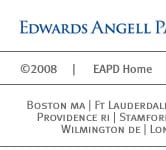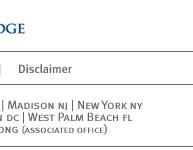
A New Approach to Disability Discrimination?
The decision of the House of Lords in the recent case of Mayor and Burgesses of the London Borough of Lewisham v Malcolm (2008) UKHL 43 may have a dramatic impact on the law of disability discrimination in the employment field. The ruling has the potential to make it much more difficult for an employee with a disability to establish a claim for indirect discrimination.
Although, Malcolm was a housing case, their Lordships made rulings on 'disability-related discrimination', which is substantially the same for the employment (s. 3A(1)), supply of goods and services (s. 20(1)) and premises (s. 24(1)) parts of the Disability Discrimination Act (DDA). In doing this they overruled the Court of Appeal case of Clark v Novacold (1999) ICR 951 and the long-standing comparator test under s. 3A(1) of the DDA.
Malcolm - The Facts
Courtney Malcolm suffered from schizophrenia and for a period stopped taking his medication. He was a tenant of Lewisham Council and as such he exercised his right to buy his flat. Just prior to completion he sub-let the property and moved out, in breach of his tenancy agreement. In response to this the Council terminated his tenancy and commenced possession proceedings. Mr Malcolm argued that because he had sub-let his flat during a period when he was not taking his medication, the Council's actions in ending his tenancy agreement and seeking possession of the flat amounted to 'disability-related discrimination'.
The House of Lords ultimately ruled that the reason for the Council seeking possession of the flat was not related to Mr Malcolm's disability, and nor was he treated less favourably than a person with a disability, who had also unlawfully sub-let his council flat, would have been.
The Law Before Malcolm
The statutory definition of 'disability-related discrimination' provides that a person discriminates against a disabled person if:
- for a reason which relates to the disabled person's disability, he treats him less favourably than he treats or would treat others to whom that reason would not apply; and
- he cannot show that the treatment in question is justified.
In order to determine whether the treatment is 'less favourable', a hypothetical comparator must be used. In Novacold it was established that because the reason behind the less favourable treatment needs only to be related to the disability, the comparator should be a person in the same or not materially different circumstances but without that reason. So if a restaurant has a 'no dogs' policy, the reason for refusing entry to a blind man and his guide dog relates to his disability and the correct comparator is a person without a dog i.e. without a reason. Further, if an employee is dismissed for taking extensive sick leave as a result of his disability, the reason for dismissal relates to his disability and the correct comparator is an employee who has not taken any sick leave, rather than an employee who has taken extensive sick leave for another reason.
This was taken one step further in Heinz v Kendrick (2000) ICR 491, where Lindsay J said that the defendant need not have had knowledge of the disability in order for 'disability-related discrimination' to be made out. He gave the example of a postman with a concealed artificial leg being dismissed for being too slow.
The Law After Malcolm
In Malcolm the House of Lords looked at both the question of who the appropriate comparator should be in the case of 'disability-related discrimination', and whether it is necessary for a defendant to have knowledge of the claimant's disability.
Looking at the first point, a majority of their Lordships (Baroness Hale dissenting) expressly overruled Novacold and concluded that the comparator test elucidated by the Court of Appeal in that case could not have been what Parliament intended. Their Lordships were of the opinion that the interpretation of the comparator test in Novacold would mean that the test would always be met, yet Parliament must surely have intended the comparison to be a meaningful comparison in order to distinguish between treatment that was discriminatory and treatment that was not. Their Lordships ruled that the correct comparator to use was a person in the same circumstances except for the disability. So in the examples given above, the comparator would be a sighted person with a dog, and an employee who had taken extensive sick leave, but not because of a disability.
On the second point, their Lordships held that a defendant must have had knowledge (or at least imputed knowledge) of the person's disability in order to be held liable under the DDA, unless the act complained of is inherently discriminatory. Moreover, that knowledge would need to inform and motivate the decision-making process in order for it to be shown that the less favourable treatment is for a reason that relates to a person's disability.
Comment
Lord Bingham recognised that the interpretation of the DDA given by the majority in Malcolm was likely to reduce the scope of the DDA and make it much more difficult for an employee to be able to establish 'disability-related discrimination'. In fact, the decision in Malcolm goes further than this and means that the concept of 'disability-related discrimination' adds nothing at all to that of direct discrimination.
Whilst it is true that the definition formulated in Novacold made it very difficult for employers to defend a claim for 'disability-related discrimination', it seems that the House of Lords have now gone too far in the other direction. This is especially so when one considers that the principles of indirect discrimination and knowledge not being a pre-requisite of liability are well established tenets of EC discrimination law.
It is possible that Malcolm will not be followed in employment law cases and at least two of their Lordships left open the possibility of a different interpretation under Part II of the DDA. Until these issues are raised in an employment case the true impact of this decision remains to be seen.
Contacts
The information in this newsletter is for general guidance only and is not intended to be a substitute for specific legal advice. If you would like any further information please contact:
Neil Adams
Partner, Commercial Litigation - London
t: +44 (0) 20 7556 4572
e: NAdams@eapdlaw.com
Rachel Lafferty
Trainee, London
t: +44 (0) 20 7583 4055
e: RLafferty@eapdlaw.com






